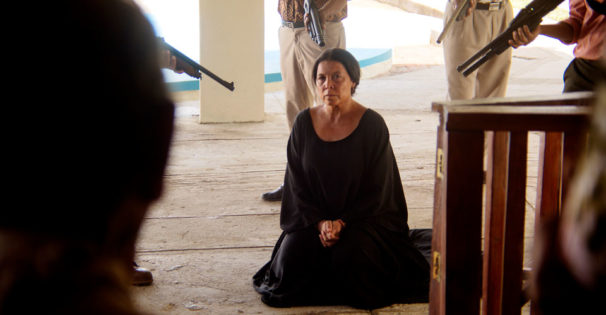
“A story about wild grass that came as a savior, but destroyed like lotus.” —Birds of Passage
Birds of Passage tells an intimate story of the erosion of tradition in an indigenous Wayúu family, to reflect the much larger impact of the Colombian drug war on a nation and society. In a tale of conflict between holding onto tradition and aiming for material wealth, Birds of Passage puts a new spin on the crime film genre.
Directed by Cristina Gallego and Ciro Guerra of Embrace of the Serpent, the film focuses on the character of Rapayet (José Acosta), who is torn between his desire to become a powerful man and his duty to uphold his culture’s values. Rapayet joins the drug trafficking business, through marijuana, in the 1970s in order to secure a dowry to marry Zaida, played by Natalia Reyes. His quick success comes with a price, as he is in constant conflict with his tribe’s matriarch, Ursula (Carmiña Martínez). The movie follows the family over the years as they deal with the corruption of their culture, values, and safety, a tragic reflection of what many Colombian families who dived into the prevalent drug trade had to endure in search of financial security.
Fans of popular crime drama films, such as The Godfather franchise, Goodfellas and Casino, will appreciate the way the movie doesn’t shy away from violence and death. As in those films, the protagonists here are painted in shades of gray rather than stagnant black and white. Corruption, betrayal and crime occur, but the film does an effective job of displaying the motives and drive of the characters.
Where the movie takes a step farther than its predecessors is exploring the theme of honor in a unique way to those belonging to indigenous culture. Most of the film’s dialogue is in the native Wayúu language, and the discussion of the old ways versus the new world of capitalist influence is interwoven throughout. It’s masterful at showcasing the puzzle piece the family represents in the larger historical picture of Colombia.
One could watch the film without being knowledgeable of the history of drug trafficking in Colombia, but with that knowledge much of the story takes on more significance. In the 1960s and 1970s there was an increased worldwide demand for psychoactive drugs. Many of these drugs were processed in Colombia, then sent to the United States, which is still the world’s largest consumer of cocaine and other illegal drugs.
During this time, powerful Colombian drug barons emerged, such as Pablo Escobar, José Rodríguez Gacha, Carlos Lehder, and Griselda Blanco. The corruption of the drug trade played a large part in the Colombian conflict, which is described as an internal war among Colombian governments, paramilitary groups, crime syndicates and far-left organizations, such as the Revolutionary Armed Forces of Colombia (FARC) and the National Liberation Army (ELN), fighting each other for increased influence in the country.

Throughout the decades, and even most recently, the United States government has been heavily involved in the internal Colombian conflict. Beginning in the 1960s, the U.S. government encouraged the attack on leftist militias in rural Colombia by the Colombian military in relation to the U.S.-led hemispheric fight against communist influence.
A telling scene in the movie reflects this moment in history: Rapayet and his friend encounter young American Peace Corps members who are passing out anti-communist propaganda, while looking to score drugs from the Colombian locals. As Rapayet and his friend Moisés make a business deal with the Peace Corps members, thus setting Rapayet on his dangerous path into drug trafficking, they all chant in Spanish, “Long live capitalism! Long live capitalism!” It’s a subtle introduction to the larger picture showing how globalization comes to Colombian society.
The film showcases the beautiful landscape of Colombia, in particular Colombia’s La Guajira region where the Wayúu tribes reside. The stunning visuals make a great contrast to the brutal incidents of murder and violence. The standout performance goes to Carmiña Martínez, playing the tribe matriarch, who constantly straddles the line of maintaining tradition and seeking prosperity for her clan and children. She’s a layered character filled with both passion and hypocrisy that Martínez plays beautifully.
Despite being a crime drama with killings and mayhem, the atmosphere is often calm and quiet. Social unrest isn’t shown through the chaotic shootouts that genre films often rely on, but rather through scenes of dark clouds, violent winds, and eerie silence, as the corrupt world begins closing in on the family.
At a little over two hours long, Birds of Passage is an expansive tale of a family in the midst of historic upheaval. Instead of focusing on infamous larger-than-life drug lords, like Escobar and Blanco, the film goes a more intimate route, telling the kind of fresh story that rarely receives attention.
Birds of Passage is currently playing in New York and Los Angeles theaters, with a national rollout to follow. The trailer can be viewed here.










